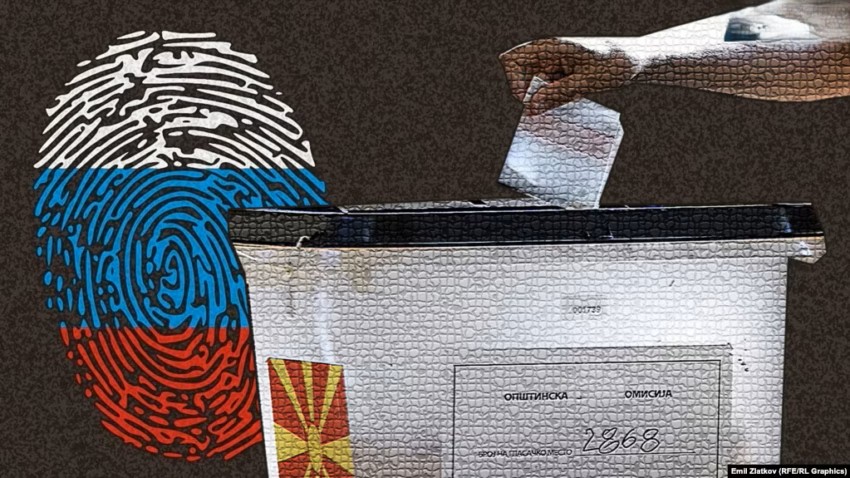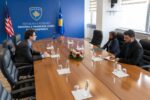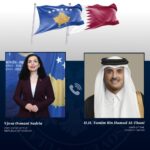Signs of Russian influence have appeared in North Macedonia’s local elections, mainly through the rhetoric and actions of certain political figures. Although these actors have minimal public support, analysts warn that Moscow maintains ideological and political proxies in the local arena, aiming to reshape political narratives, especially regarding Euro-Atlantic integration.
Pro-Russian Rhetoric From Minor Parties
The most direct example is the “United Macedonia” party, led by Janko Bačev, which openly advocates stronger ties with Russia and rejects NATO and EU integration.
Its candidate for Skopje mayor, Zoran Jovanovski, said he seeks to build close ties between Skopje and Moscow and has “established contacts with at least 15 Russian, Chinese, and Belarusian investors” interested in infrastructure and tourism projects.
Jovanovski also spoke of fostering a so-called “Macedonian-Slavic-Eastern friendship”, attracting Russian and Belarusian tourists, and even erecting a statue for Russian consul Alexander Rostkovsky, killed in 1903. Recently, he expressed hope that Donald Trump’s return to the U.S. presidency would “help Moscow achieve its geopolitical goals.”
“United Macedonia,” modeled after Vladimir Putin’s United Russia, has never won a parliamentary seat but is fielding candidates in 29 out of 80 municipalities for the October 19 local elections.
Another minor party, Rodina, shares similar ideology, campaigning under the slogan “Think globally, act traditionally.” Its candidate Zoran Jovančev warned that “if you follow a comedian, you’ll face national tragedies like in Ukraine,” a jab at Volodymyr Zelenskyy.
Though marginal, these parties receive limited media coverage during election periods, enough to spread Kremlin-aligned messages. According to a Metamorphosis Foundation analysis, their public impact remains restricted but potentially harmful.
Hidden but Risky Influence
Despina Kovačevska of Metamorphosis said the foundation’s media monitoring detected Russian narratives not only in political messages but also in statements from church representatives.
“These narratives mirror the Kremlin’s disinformation line that EU membership leads to a loss of sovereignty,” she said, referencing EUvsDisinfo reports on malign foreign influence tactics.
The OSCE/ODIHR election observation mission has also expressed concern over low media literacy among voters, making the public more vulnerable to social media disinformation.
Meanwhile, political analyst Xhelal Neziri believes these narratives are unlikely to significantly sway local election outcomes:
“Given the local nature of these elections, it’s difficult for such narratives to shape public opinion in favor of foreign agendas.”
A recent Institute for Political Research survey found 61% of Macedonians would vote “Yes” in a referendum on EU membership — indicating strong public backing for integration.
Apasiev and “The Left” Party’s Moscow Connection
The only parliamentary party with clear pro-Russian leanings is The Left (Levica), led by Dimitar Apasiev, who attended Russia’s Victory Day Parade in Moscow in May 2025 at the invitation of Communist Party leader Gennady Zyuganov.
Apasiev, who delivered a speech in Moscow praising “anti-fascist values,” has also been accused of Euroscepticism and frequent contacts with the Russian Embassy in Skopje.
During the campaign, he complained that his party was denied access to state advertising funds, vowing to appeal to the European Court of Human Rights for discrimination.
Pro-Russian Figures in Government
Deputy Prime Minister Ivan Stoiljković, head of the Democratic Party of Serbs in Macedonia and a coalition partner of VMRO-DPMNE, is known for his close ties to Moscow.
He and Russian Ambassador Sergey Bazdnikin jointly laid flowers at the “May 9 Victory Monument” in Skopje, symbolizing strong historical and political connections. Stoiljković has repeatedly participated in Russian security forums, describing them as “valuable experiences” and maintaining both “official and unofficial channels” with Moscow.
The opposition SDSM also faced criticism when a delegation in Bitola, led by Metodija Kunovski, honored Russian consul Rostkovsky this August, underscoring the soft power reach of Russian symbolism.
Analysts: Soft Power Prepares Ground for National Elections
According to analyst Xhelal Neziri, these localized pro-Russian efforts serve as a testing ground for future national influence campaigns:
“This invisible Russian presence is preparing the ground for parliamentary elections. The real goal is not these local races but the broader political landscape.”
Kovačevska agrees, noting that such narratives portray Russia as a viable alternative and deepen domestic polarization, distracting voters from reforms necessary for EU accession.







